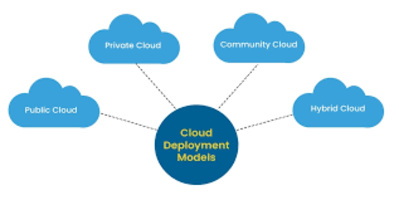Cloud migration is the top priority for digital leaders in this advanced tech era. After the global pandemic, 84% of organizations have switched to the public cloud to ensure data safety and low IT costs. Cloud migration has enabled the transfer of IT resources from private servers to public cloud architecture. It comprises advanced software, CRMs for businesses, data-driven databases, mobile applications, and IoT and IT administration tools. This blog post will cover why cloud migration benefits is a significant aspect of modern organizations, highlighting its convenience and benefits.
What is Cloud Migration?
Cloud migration is a procedure for transferring business operations, data, security assets, and infrastructure to a cloud-computing setting. Companies wishing to move from unreliable infrastructures, IT resources, or outdated hardware and software are now considering cloud migration to improve their operations and productivity. Cloud allows companies to achieve real-time performance and efficiency. Utilizing the latest IT resources and tools also reduced the IT administration burden. Cloud migration services have become necessary for companies to meet increased online demands and high-security standards.
Benefits of Cloud Migration
Cost Efficiency
One of the most essential benefits of cloud migration is reducing the cost of ownership and resources. Digital leaders and IT professionals are now focusing on cost efficiency with a focus on advanced technology. Cloud migration allows companies to deliver faster delivery times and create innovation opportunities. It also reduces the burden for small startups focusing on budget-friendly solutions to expand their brand reach and services.
Scalability and Flexibility
Cloud services give companies scalability and flexibility, which are integral to meeting changing online consumer demands and market trends. These features increase companies’ ability to adapt effectively and support digital customers while conducting online operations. Companies pay only for the resources they utilize and don’t need to pay any unnecessary costs to maintain their digital assets.
Enhanced Security
Many business owners have security concerns when migrating to cloud-based technology. Cloud services providers follow the highest security measures to protect your business data. The digital assets are secured with robust safety measures to safeguard them against cyber threats. Cloud migration also gives companies access to reliable backups and disaster recovery solutions to ensure continuity in business operations.
Improved Performance
A cloud-based infrastructure can increase performance using advanced tools like remote desktops, web/mobile applications, virtualization, and distributed computing. It enhances user responsiveness and leaves a positive customer experience for your brand. The benefits of moving to the cloud include employee productivity, as teams can communicate more effectively via virtual tools to discuss project insights and performance reports.
Streamlined Collaboration and Accessibility
Cloud-based solutions allow your team to work on their projects from anywhere with an internet connection. This situation enables smooth collaboration, allowing employees to situate their task plans in real time, regardless of location. In addition, it will make even the most challenging geographic locations workable via remote employment arrangements, which widens a range of resources and makes your workforce an excellent choice.
Simplified Maintenance and Updates
Keeping on-premise IT infrastructure running and ready for any needs also means a great effort to manage. Software updates, hardware upgrades, and systems may be time-consuming, distracting, and irritating. The cloud is in charge of your IT “maintenance” duties. The updates are remotely installed, and you have nothing to worry about if the hardware fails or software-compliant options aren’t available. This saves time when operating your IT department and working on its strategic plans.
Environmental Sustainability
Cloud facilities operate at target standards. Through resource unification and the use of economies of scale, cloud computing has the potential to be ecologically sound and have a smaller environmental footprint than on-premises information technology infrastructure. This can be equated to lower energy consumption and better business operation, two of the best advantages or benefits of migrating to the cloud.
How Does the Process of Migration Work?
- Planning and Assessment: This is where you conduct a complete audit of your current IT strategy and the number and type of your existing devices. What kinds of applications do you use, and what data do you collect? How much storage space is needed? Should you choose an HDD or an SSD? A cloud service provider can assist you in analyzing your needs and suggesting the best solution for your cloud environment.
- Choosing Your Cloud Service: There are different options for cloud deployment models, such as public and private clouds. Which is a good choice for you depends on your security requirements and budget.
- Migration Strategy: There are different ways of transferring your application and data. Some applications may be cloud-transferred easily, while others might need to be adapted to cloud conditions.
- Data Migration: This is the key to the whole procedure. Data sharing to the cloud is a process that should be made with very tight planning, precautions, and choices. Cloud providers have developed different mechanisms and toolkits to ease the migration process.
- Testing and Optimization: After migrating your data and applications to the cloud, the final step is the testing stage. This will ensure all devices work correctly and detect any areas with possible optimizations. It is essential to fine-tune your cloud setup efficiently and quickly.
- Ongoing Management: Cloud migration is not a one-time process. Cloud providers provide various management tools to monitor effectiveness, security, and affordability. Your IT team can also leverage these tools to ensure a smooth cloud experience.
Considerations Before Cloud Migration
Companies considering cloud migration can encounter possible challenges related to their resources, IT setup, or business needs. Navigating the cloud migration framework requires professional expertise and careful assessment. Before implementing cloud-based solutions, one must consider these considerations in their strategy:
- Transitioning your business to the cloud offers efficiency, scalability, and many other advantages. However, several essential factors should guide you through the process before you push the migration button.
- Not all applications are built the same, either. While many older programs might already be cloud-ready, some programs might need full help utilizing the cloud architecture or need significant adjustments to perform well.
- Consider how much your applications are relied on in everyday operations. Migrating a mission-critical app requires careful planning and as little downtime as possible to maintain your workflow. Apply a phased migration, starting with less critical apps and gaining experience before moving your key ones.
Accelerate Your Cloud Journey with Advanced Computer Technology (ACT)
Don’t let cloud migration leave you grounded. Advanced Computer Technology (ACT) is your one-stop shop for a smooth and successful transition. Our expert team will assess your needs, navigate complexities, and ensure a secure, high-performance cloud environment. Contact us today and take your business to new heights!
Visit Our – https://www.actnv.com/service/cloud/
FAQ's
Cloud migration can benefit most businesses, but it’s not a one-size-fits-all solution. Elements to consider include application types, budget, and security requirements. Consulting a cloud specialist can help you decide which cloud option is best for your business.
Select a cloud service provider that has appropriate reliability and strict security features. Encryption, access controls, and data backup plans are extremely important.
Planning and step-by-step implementation are essential. To minimize customer disruptions, start migrating the less critical applications first and seek professional advice.
Data transfer methods that ensure safe transmission are used. A well-known cloud services provider will have standardized procedures and methods to keep your data secure.
Cloud reduces initial hardware costs and frees IT staff. Pay-as-you-go models and reduced maintenance needs can lead to significant cost savings.





